Getting to Know Deena Jalal

Deena and her sons / Photo Credit: FoMu
Here we go again—sneaking behind the kitchen ice cream shop door to continue our Industry Chats series, getting the scoop (this time quite literally) from some of Boston’s best chefs and restaurant owners on how they do what they do. This time we’re featuring Deena Jalal, owner of FoMu ice cream. You can find FoMu all over Boston. They have permanent locations in Allston, Jamaica Plain, and the South End, as well as pop-up locations that have been on Newbury Street and in the Fenway neighborhood. They are featured in restaurants and grocery stores, such as Whole Foods, around town so you’re sure to run into them somewhere. And trust us, you want to. In their shops they also sell ice cream cakes, ice cream sandwiches, and tons of home-baked treats.
Growing up, Deena watched the hard work of her parents who were entrepreneurs raising three kids. While the entrepreneurial seed was planted for her at a young age, she also grew up loving ice cream, proclaiming it her favorite food. It seems that opening her own ice cream shop was in the cards all along. Now, with three kids of her own, she is sharing her entrepreneurship with her growing boys and involving them in her business as much as possible.
I sat down in the Allston shop with Deena on a sunny fall morning before they opened. She walked in with a huge smile on her face that never faded through the interview. Her passion for what she does and for her family are so evident in how she talks about them with infectious excitement and energy. Enjoy getting to know her better, we sure did!
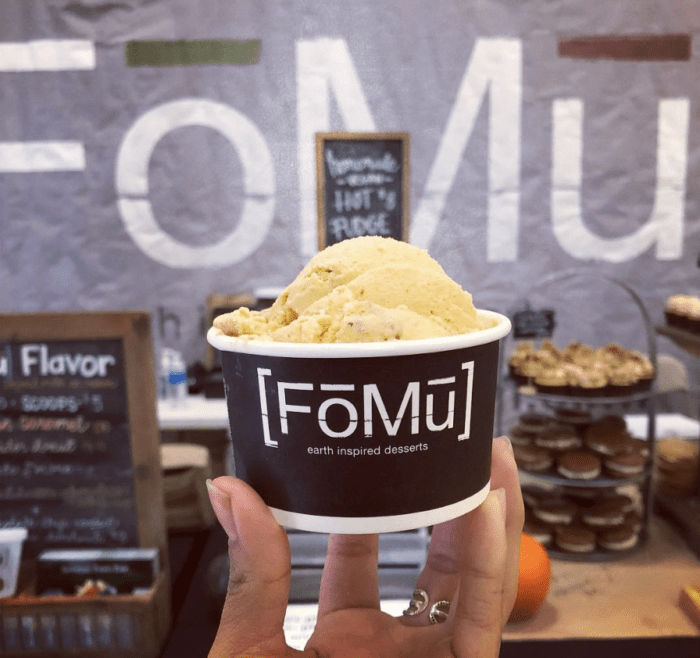
Mango lassi / Photo Credit: FoMu
Give me some background: Where are you from? Where did you go to school? What did you study?
D: I grew up in Western Massachusetts. I did my undergrad at Smith College, which is a small liberal arts college in the western part of the state. Then pretty quickly after that I moved out to Boston. I met my husband, who grew up in the town next to mine, and he went to school here at Bentley. He worked in finance and I worked in marketing and advertising. So both of us got jobs in Boston at companies and did that for a decade. But pretty much in all of our spare time we were just like our parents were, small business owners, so entrepreneurship was in our blood and we were always talking about it. We always wanted either a market or an ice cream shop or something that seemed like an attainable, community-oriented, little business for ourselves. But we were both on our paths and it wasn’t until we got married that both of us thought, these paths just aren’t for us.
At that point I started digging at what it was that I wanted to do and I remember being at my job at my desk writing out lists of everything that I loved and trying to find some commonality. And it was food, and it was community, and it was people, and it was eating, and it was eating food, and it was eating ice cream and I just realized that I can’t think of a happier thing than selling ice cream. Food is complicated. I’m not a chef, people come in hungry, there’s a lot of elements to get wrong. But ice cream—people walk in excited and they leave happy.
At that time I went back to school to get my MBA, and I was taking this awesome class called “Buying A Small Business,” and they said that if you don’t have a business background and you want to learn how to run a business, to buy an existing business; even if it’s not amazing, buy a business in that industry and learn there, find out if it’s for you. So we bought a small ice cream shop and worked full-time and ran it at night. We really liked it so my husband left his job and a year later I left my job. The part that we didn’t like is that we didn’t make the ice cream.
It’s hard to make ice cream, it’s a lot of work, it costs a lot of money, you need a big facility, and a lot of employees. So a lot of people buy it from a big wholesaler like Hershey’s or a generic local wholesaler and those companies ship it in every week and replenish as you need. And if you were to make your own ice cream, most dairy ice creams are made from a mix because it has to be pasteurized, and it has to be very processed in such a way that it is very stable and I didn’t love that either. So we were sort of feeling out what our options were.
Along the way we knew that we wanted to create something that was unique, uniquely flavored, unique in general, and one that was health-oriented and sourced really well. And one thing that we recognized is that most of those things did not exist together at that time in Boston. This was close to 10 years ago. But there were also soy powder ice creams, and we thought, well what if we did something that didn’t include dairy? At that time soy powder had really horrible ingredients and we decided that, OK we’re going to make ice cream, and we found a facility that was for sale by a man who had been working in the dairy ice cream industry for decades, and he came on as our mentor.
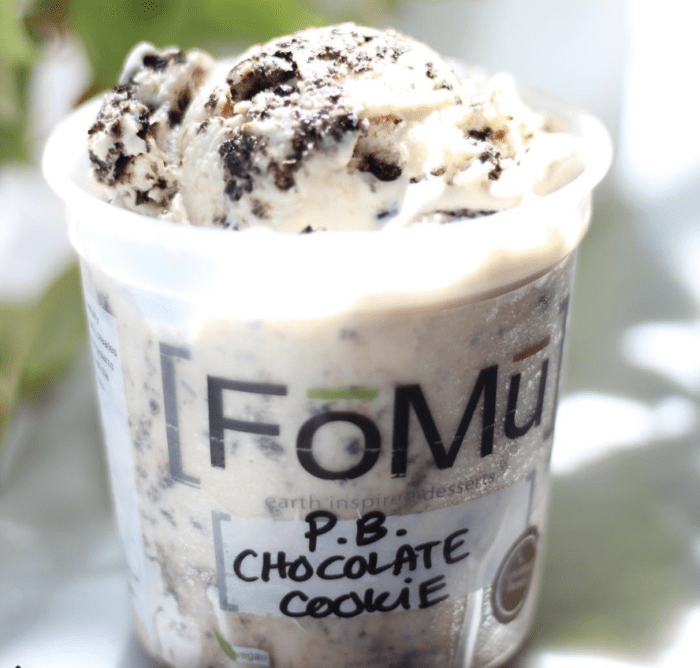
P.B chocolate cookie / Photo Credit: FoMu
We took over that facility and he taught us things about ice cream, and in doing so he said that he had had restaurant customers that were interested in dairy-free ice cream alternatives. He showed us the options and there was coconut milk, and we thought it was amazing. It’s creamy, it’s floral, it tastes great, and you don’t have to do anything to it. The consistencies of any other alternative that we looked into were not even close. So we made a handful of test batches and brought them to a few local restaurants like Life Alive and Veggie Galaxy, health-oriented places, and they said, “Sign us up, we will take this!” So we thought, OK, there’s a market for this for sure so let’s do that. So for six months we worked on the recipes and sold to these restaurants. By then I was eight months pregnant with my first little boy and the Allston space opened up. We thought it would be low-risk. It’s Allston, people are progressive and open-minded, and the space was already an ice cream shop. So we did light renovations, opened the doors, and the business did well.
We sold our other ice cream shop and our first year here was better than our best year at our other ice cream shop. And everyone who came in was asking when we’d be coming to other neighborhoods. After we were here for a year we opened our shop in JP and then the Whole Foods that just opened up in JP asked if we would sell our pints to them. We were really not in a position to do that, but we followed their process, it was a yearlong process, and then we started selling pints to other local Whole Foods. Once we were in their system, other Whole Foods wanted to sell our ice cream so we hired a distributor to distribute our pints to Whole Foods and other specialty food stores in New England, so that’s where we are now.
We also opened our South End shop a couple years later. Every store is a reflection of its neighborhood. And since a few years ago we’ve had seasonal stores in Cambridge, Fenway, and on Newbury Street. We’ve looked at spaces all over the place and those are really fun because we get to set up in a totally different neighborhood and sell when it’s busy and spread awareness in that way. So it’s been really fun. We’re looking at other neighborhoods, and doing our thing, and since then I’ve had two more boys, so growing all the babies.
Are they the official ice cream testers?
D: They are forever vanilla and cookie ice cream eaters!
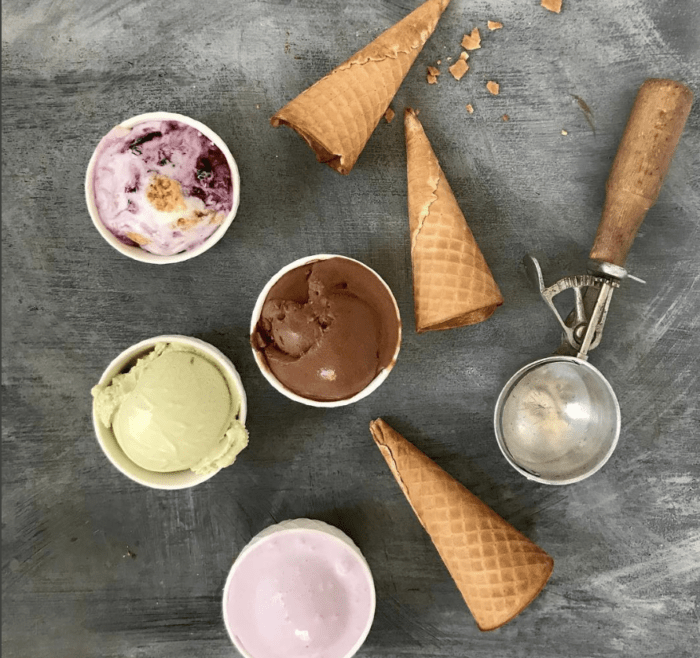
Blueberry shortbread, chocolate pudding, lavender, avocado / Photo Credit: FoMu
As an ice cream person, how do you feel about vanilla?
D: I think vanilla is great. Vanilla is one, versatile, but two, is like the person that we bought our facility from said, “You always want to try an ice cream’s vanilla, because that is the true testament to how good that ice cream is.”
What was the very first flavor you tried to replicate from a dairy-based ice cream?
D: Vanilla! It was your standard, vanilla, chocolate, strawberry. And then we were intent on having really unique flavors so we started with always having something with a liquor, and always having a spicy flavor, just uniquely-flavored, internationally-inspired flavors.
Is blueberry shortbread still your favorite FoMu flavor?
D: Yes, it’s still my favorite. I love blueberry shortbread. And when I’m kind of in an indulgent mood I like flavors like our cookie dough. I’ve never liked cookie dough ice cream but our cookie dough, like the cookie dough is so good, and I don’t think you realize how bad most cookie dough is until you have good cookie dough.
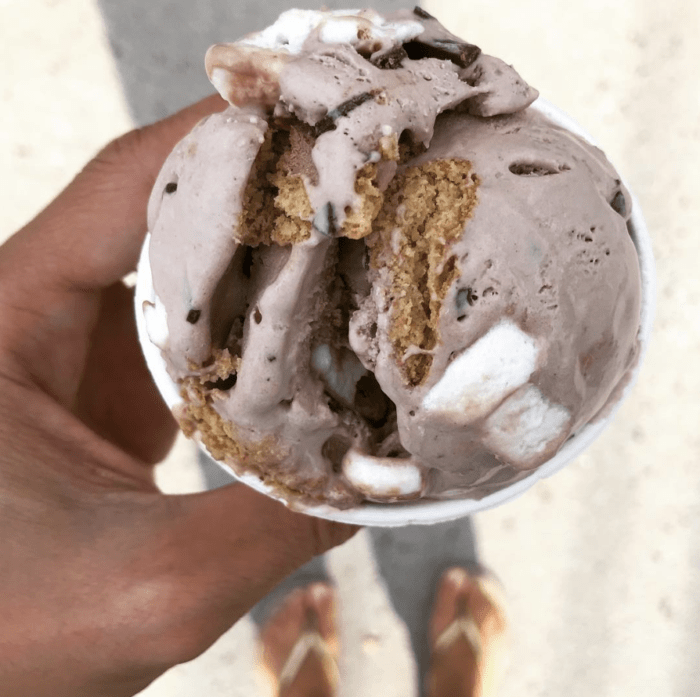
S’mores / Photo Credit: FoMu
Where and when did your sweet tooth emerge?
D: Growing up, we never really had sweets at all. My mom is a dental hygienist and my dad immigrated here from the Middle East so everything was made from scratch and when we did have sweets it was usually for the holidays and it was usually Middle Eastern sweets. But growing up, the one thing that we would get was ice cream. And it was one of those things that we got on vacation or when something was going on my mom would buy this very specific brand of natural vanilla. So I didn’t have a sweet tooth early, but I remember dessert being a very special thing.
Did both of your parents cook growing up?
D: Yeah, both. I think my mom, being a mom, was more traditional, like get food on the table. But on the weekends my dad would make brunch and he was very into bringing us into cooking.
I know they are still young but how important is it to you to bring your kids into the kitchen and food education be a part of their lives?
D: Huge. I think the best thing that you can do is grow food or go to farms and get food so then they see it. All of my kids are really lucky, they’re all really good eaters. We really raised them eating what we ate so they have eaten adult food since they were babies and they’re OK with that. They don’t need a kids’ menu they’re fine eating whatever. So, yeah, I think it’s really important.
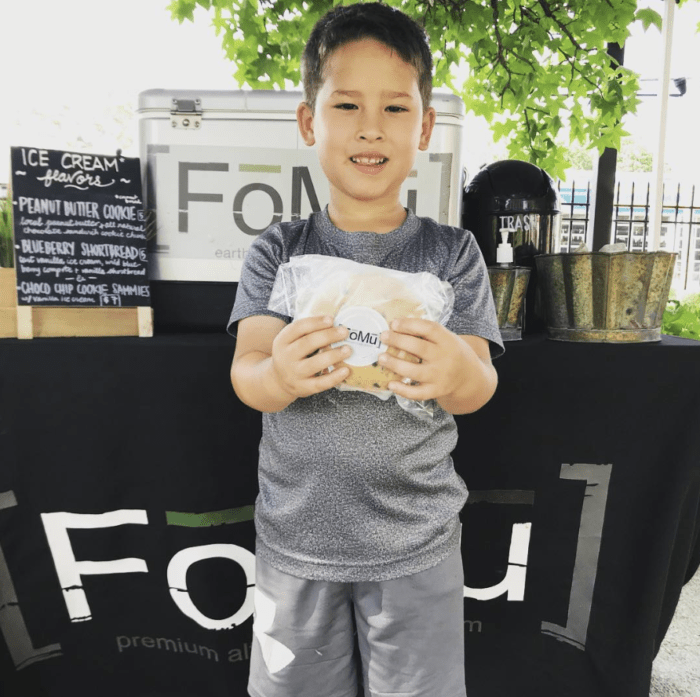
Deena’s son with a choco chip cookie sammie / Photo Credit: FoMu
Is your husband as into food as you are?
D: He’s very into food. He loves to eat. And my husband is of Chinese descent. His family came over from Vietnam and Southeast Asia so he loves flavor and he’ll eat just about anything. I think what he didn’t realize so much is the importance of where food comes from so I think that I sort of brought that to the table. And I honestly think he does understand it now and he knows what’s an indulgence and what he probably shouldn’t have and will have that on occasion and so I think he’s become this really well-rounded, food-oriented person.
In terms of local ingredients used in the business I know that is so important to you, and that’s ideal, but logistically how does that work?
D: Logistically it’s hard. New England is really hard. There’s not a lot that’s local all year-round. And particularly coconuts. The main ingredients in our ice cream are not local, so for me to say that we’re a local ice cream company is sort of a misnomer but we do try to include things and buy locally when we can. Like right now, we’re getting Carlson’s Orchard cider and we’re selling it in the stores and we’re putting it in our ice cream. We’re making our own jams, we’re making our own syrups. Everything that we’re making, we’re making from a mile and a half away.
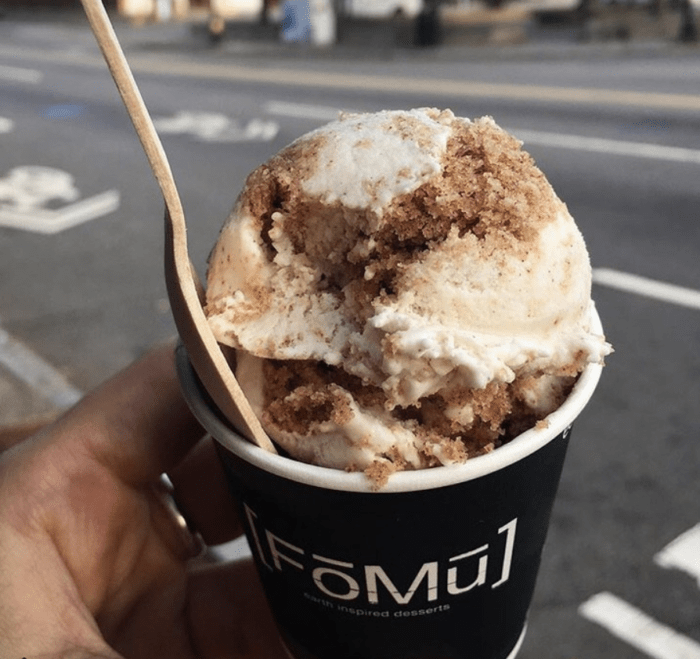
Apple cider doughnut / Photo Credit: Rachel DeSimone
I know that the coconut is the aspect that makes the ice cream super smooth and thick and creamy, talk about how important it was having the texture really spot on for the ice cream. Also, what does it mean for your ice cream to only have 25 percent air?
D: So when you pay a little bit of money you get an expensive product. When you pick up some other ice cream it’s so light, and then you pick up our pint and you see it’s so heavy. The heavier it is the more ingredients are in there and the less air is in there, so that’s a huge contributor to the quality of the ice cream. When you buy ice cream from a store it’s anywhere from 50-70 percent air, which is really high. We make ice cream like gelato, so very little air in it.
Tell me about the process of the name. Who came up with the name FoMu? Did you have any really cheesy names before it?
D: I must have had a notebook full of words and drawings. It was harder than naming my children. We thought of a name and the name was taken. It was literally the hundredth hour and I needed something that had to do with ice cream, but didn’t have any dairy in it. I thought, I need something that’s no dairy, like no moo, but I didn’t like the word “no” because it sounded so negative, and I use the word faux a lot and I was like, “faux moo,” and they said yes use that. It’s abstract, it’s short. It’s unique enough that people remember it.
I did not realize that you started FoMu separate from something allergy-related. How do you feel about being accessible to people with allergies and that identity being associated with the brand?
D: Often people will ask, “Do your kids have food allergies?” And I don’t know yet because I still have a tiny baby, but I’m fortunate enough that my older two don’t. It’s hard to not know someone with a food allergy. It’s not THE REASON I did it. We did it because we wanted a great ice cream that was unique and that was sourced well. And when we realized that there was this whole population of people that couldn’t have this, and this thing we were like OK, well if we’re going to do it let’s make sure that it’s accessible to those people.
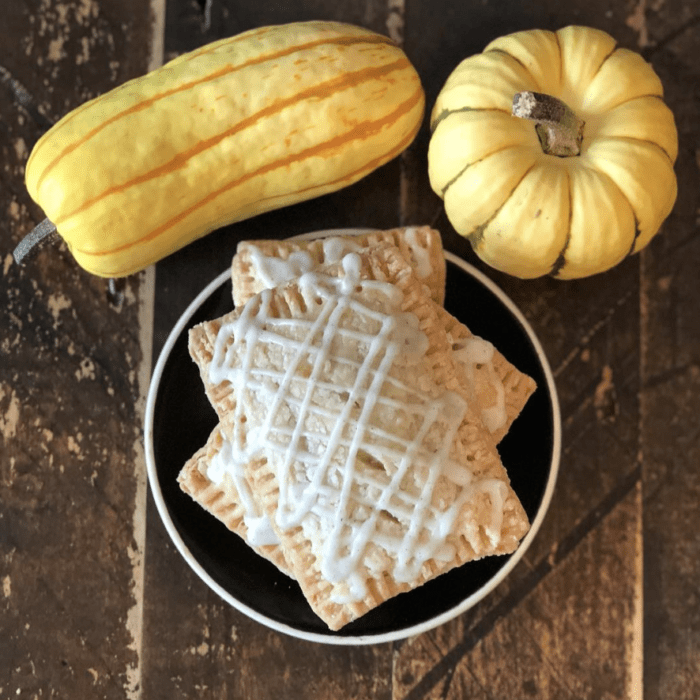
Apple butter poptarts / Photo Credit: FoMu
What does it feel like being a female business owner in Boston? Simultaneously, what does it feel like to have paved the way for vegan desserts in Boston?
D: Being a woman business owner, it’s the most challenging because I have kids. I very fortunately don’t feel like I’ve been in very many situations where I wasn’t taken seriously. I’ve always stood my ground and I have a strong personality so I’m sure that’s helped contribute to it. But the most challenging is trying to be a great mom and a great business owner because literally they’re all your babies and when you take from one you’re giving to the other and vice versa. And so to me it’s one of the reasons I started the company but it’s also one of the reasons I think we’ve had very paced growth and we’ve only taken on so much because I never want to miss this time with my kids. They come to the stores with us, they go to our commissary with us, they’re very involved and it’s very important that they don’t feel like, oh mom and dad are leaving me to go to work, I know exactly what they’re doing, and I go with them sometimes. It’s very tangible to them. I feel like a lot of kids growing up feel like, my mom goes to this building and that’s what she does and she has to do this and I’m not sure what it is. They very much feel part of it. And we’ve done ice cream socials at their school and food education classes at their school and I think it’s more empowering than, my parents are being taken away for this reason, and that was 100 percent of the reason why I wanted to start a business.
As far as paving the way for vegan, I think all of that has come organically. It’s actually amazing that there’s so much education and awareness around food and sourcing good ingredients and eating locally, and we’ve fused it all together. So it’s great to think that I paved something but it all came together at the right same time and we’re fortunate for that to have happened and I think it’s helped us in our growth.
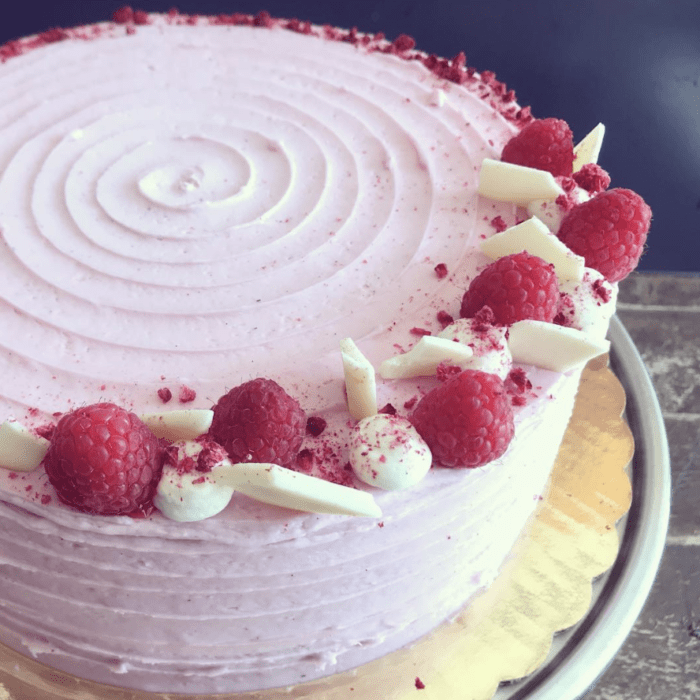
Vanilla cake with homemade raspberry jam and rose-scented buttercream / Photo Credit: FoMu
You talk about on your website giving customers and staff members peace of mind. Where does that come from and what weight does peace of mind hold for you?
D: I pretty religiously shop in farmers markets and specialty food stores because until I really started paying attention, things that you assume are one ingredient, aren’t. One example, I wanted to get some garlic and I didn’t see any fresh garlic, so I said I’ll just get this jar of garlic. What could it have in it besides garlic, possibly vinegar, possibly some salt? I looked again and it was garlic, and then a million other preservatives. Peace of mind to me is going somewhere you know where there’s a stamp on the door that says we only use natural ingredients, they’re all plant-based. That we’ve made this promise to use these things gives people peace of mind that they can come in and get that. That’s the integrity behind the brand and all the marketing that happens. Everyone always wants a piece of the plant-based market, and the, oh we’re local, oh we’re this, we’re that, and that’s fine but you have to have integrity and hold true to that and when you walk into our stores you have that same peace of mind that I do when I go to a farmers market or when I go to an organic food store. I want to give that same thing to people, for dessert. Eat carbs, eat sugar, eat fat, but don’t eat chemicals!
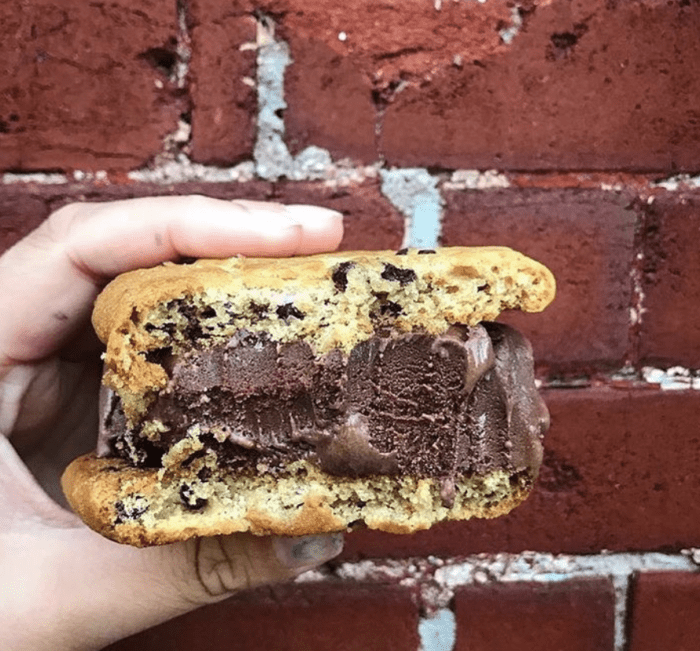
Gluten-free chocolate chip cookie ice cream sandwich with chocolate pudding ice cream / Photo Credit: @bostonglutenfree via Instagram
*Rapid Fire Questions*
Describe FoMu in three words
D: All-natural, plant-based, fun
Who is your biggest food icon/inspiration?
D: I really love Kenji López-Alt. I love him, I think he’s great. I follow him on Twitter and I love what he posts so I would say that he would be at the top.
What do you eat late night/early morning after a long shift?
D: I’m up really late. I rarely go to bed before midnight. I would say I always find myself going to a jar of peanut butter. It’s always peanut butter.
Chunky or smooth?
D: Both. When I feel super indulgent I want it to be smooth, but I appreciate the chunks too.
What is your one go-to dish that you can make in your sleep?
D: I cook everything, it’s a big thing, and I always make things from scratch, nothing comes out of a box so I cook a lot and have a lot in the rotation. I make a lot of Thai curries and the boys are really good eaters, they love tofu and greens. So I’ll take whatever we have for vegetables and chop them up and add some coconut milk and throw in some shrimp or tofu. It doesn’t require too much measuring so that’s one that I do a lot particularly in the winter. I have a summer and a winter repertoire so that’s like right now what I’m probably going to make for dinner.
What is your favorite dish (or dessert) in Boston?…Not from your own place.
D: When we go for dessert we’re almost always going for ice cream. I love Honeycomb Creamery in Cambridge, they’re great. If we’re going out for dessert, it’s for an occasion. We love pies. There is a pie company in Cambridge called Petsi Pies that’s great and my husband will go and get pie from them or doughnuts from Union Square Doughnuts.
Are there any foods you hate?
D: Zero. The two last things that I disliked were capers and cilantro and I learned to love both of them in my last pregnancy. And between my husband’s ethnic background and my ethnic background, I’ve eaten a lot of weird things.
Tell me about a food memory that stands out for you from anytime or anywhere in life.
D: Our CSA just ended but there are two food memories that always pop into my head from when I was a kid. One was going to the farm, my parents were avid farm-goers, and two, getting ice cream because that was the only dessert we got, and it was during vacations, so it was very momentous, like things that we would wait for. Whenever I’m down hair-deep in a tomato plant I always think about eating vegetables as kids. My parents were always like, “Eat this whole tomato!” And I do the same thing to my kids, I’m like, “Eat this whole tomato! Eat this whole pepper!” And the smell of the dirt and that whole experience brings me right back to when I was a kid.
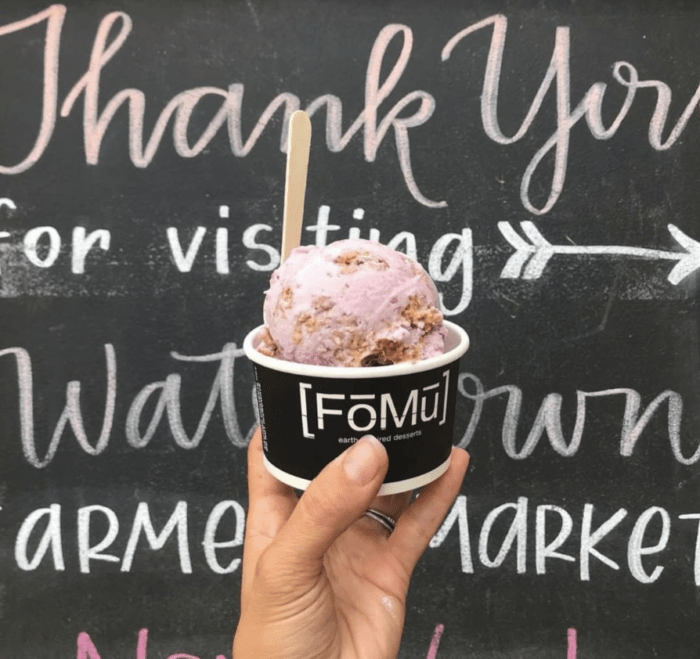
Strawberry rhubarb with homemade pie crust / Photo Credit: FoMu
Join us on our Allston Arts & Eats Tour or our Sweet & Savory South End Tour to try FoMu!
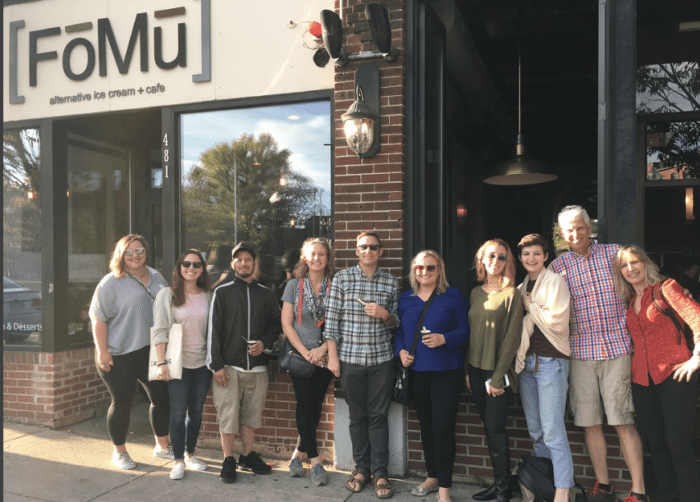
Bites of Boston tour group / Photo Credit: Rachel DeSimone
Return to Boston Food and Fun Blog


